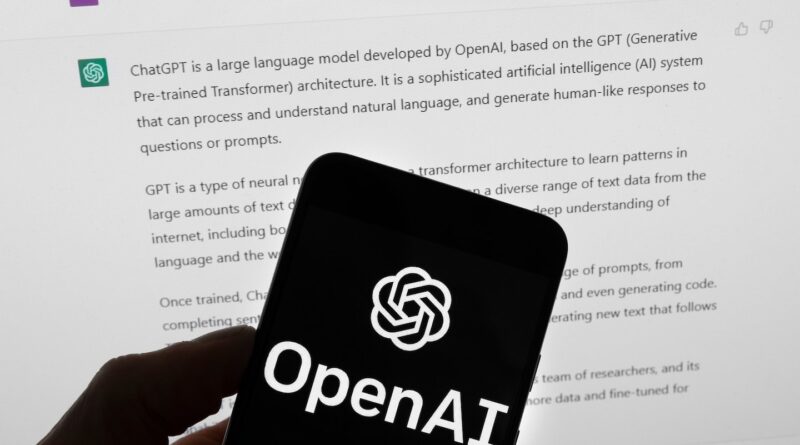A Brazilian city passed a law about water meters. ChatGPT wrote it.
Rosário said the chatbot processed a 250-character command and took some 15 seconds to employ its algorithmic magic and spit out a policy — a process that would normally take him about three days. The result, he said, showcased how artificial intelligence can be a useful tool for optimizing and improving public service. Yet Brazil’s first ChatGPT-crafted law has launched the South American nation into a debate ringing across the globe: As artificial intelligence takes the world by storm, is society gearing toward a future where automation replaces humans?
“I go back to that phrase that has already become a sort of cliché in this subject: No one will be replaced by artificial intelligence, but we could all be replaced by those who know how to use artificial intelligence,” Rosário told The Washington Post. “So we have to prepare ourselves for this path.”
A primeira lei brasileira feita exclusivamente por inteligência artificial está vigente em Porto Alegre!
Ela não tem nada de ideológica. Ao contrário, é bem comum. Ela impede a cobrança pela prefeitura de hidrômetros furtados. Aliás, passaria despercebida se eu não contasse.…
— Ramiro Rosário (@curtaramiro) November 29, 2023
A self-declared tech enthusiast, Rosário wanted to bring “the debate surrounding the beginning of a great technological revolution” into the political and public spheres, he said. For months, Rosário had been flooded by his constituents’ complaints about being charged when their city-owned water meters were stolen, and he wanted to do something about it.
In June, Rosário sat at his computer, opened ChatGPT and typed in a command: “Create a municipal law for the city of Porto Alegre, originating from the legislature and not the executive, which prohibits the Municipal Water and Sewage Department from charging the owner of the property for the payment of a new water meter when it is stolen.”
The chatbot whipped up a proposal with a justification and eight subsections. Rosário was “astounded,” he said. The most “extraordinary” part? Rosário said ChatGPT came up with two ideas that had never crossed his mind: setting a 30-day timeline for the city to replace stolen water meters and, in cases when that deadline wasn’t met, exempting property owners from paying their water bills.
“If I had followed the usual process, it would’ve taken days to sit down with my team and legal sources,” he said. “But in a fraction of that time, AI looked into the best references regarding good practice in drafting bills inside and outside the country on its database. This was an unprecedented process of an AI-drafted bill that brought in suggestions that were in line with the principles and values of my mandate — I knew I had to sign it.”
Rosário submitted the text on June 7.
As a machine-learning model, ChatGPT combines training from humans with knowledge derived from a variety of sources, including Wikipedia, books, news articles and scientific journals. It parses queries and produces answers by predicting what comes next in a sentence — essentially, digesting huge quantities of data and inferring relationships between the words in the text.
Though users have employed it in an array of ways — writing college essays, crafting Eminem-style lyrics, drafting a biblical verse explaining how to remove a peanut butter sandwich from a VCR — experts have warned against relying on ChatGPT because it has a penchant for producing minor errors at best and flagrant misinformation at worst.
The council’s legislative drafting branch revised Rosário’s initial proposal and adapted its wording to the typical style used in legislation. But it made minimal changes and did not object to any part of the content, according to before and after copies of the text reviewed by The Post. In fact, the city worker who analyzed the text suggested amending Porto Alegre’s existing 1987 water and sanitation law with subsections from Rosário’s proposal, records show.
On Oct. 18, after further review by the council’s judicial and constitutional committee, the council voted in favor of Rosário’s law, which got its final approval from Porto Alegre’s mayor shortly after.
A week later, Rosário took to social media to reveal his secret: “The first Brazilian law made exclusively by artificial intelligence is in effect in Porto Alegre!” he wrote on X, formerly known as Twitter.
His peers were flabbergasted, he said. Some were fascinated. Others decried the lack of transparency. Council President Hamilton Sossmeier initially told local media that, even though the use of AI is not explicitly prohibited, he thought it could set a “dangerous precedent.”
Sossmeier then changed his mind: “I started to read more in depth and saw that, unfortunately or fortunately, this is going to be a trend,” he later said, according to the Associated Press.
Rosário said he initially kept his use of ChatGPT under wraps because “many colleagues still hold a prejudice against AI, and I didn’t want to risk a concrete and beneficial law not being voted on just because it was written by a chatbot.” Plus, he added, his experiment “showcased the gains we can make if we use this technology.”
In AI, Rosário sees a tool that can “be harnessed for the good of the public, if we’re informed about best practices.” He pointed out that the city council recently approved two laws that were already in effect and has also passed bills that were later found unconstitutional, saying that employing AI could help lawmakers better analyze policy proposals.
Plus, he added, the AI revolution “is really no different than the changes the internet and computers brought. Remember how everyone was scared of computers taking over? Well, look at how helpful they’ve been so far.”



